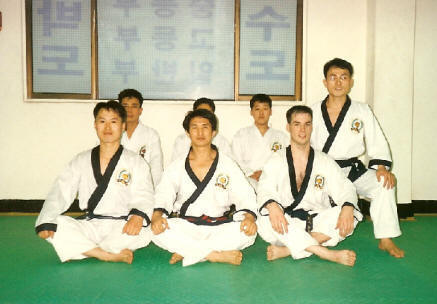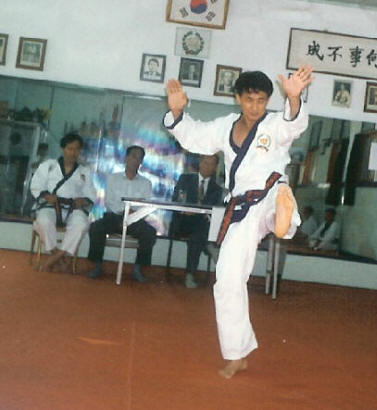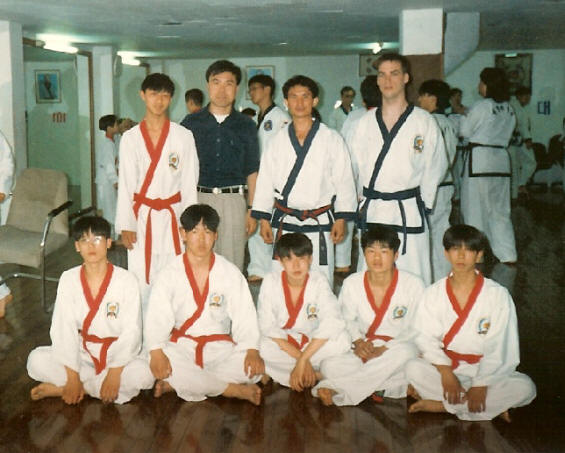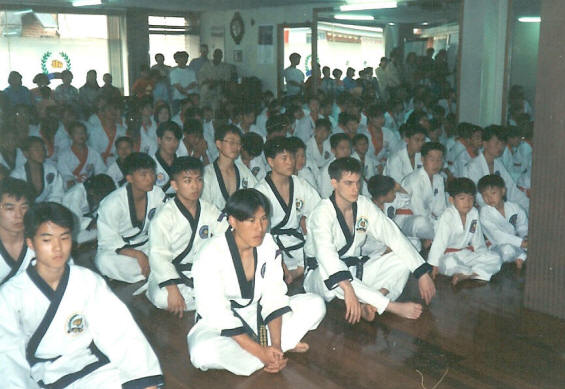Training in Korea
Part 3 of 5
By Master Todd
Huddleston - 8th Dan
Yonsei Martial Arts Academy, New Orleans, LA
|
|
|
 |
|
|
|
|
|
|
|
Sitting center
- Master Han and Master Huddleston to his left |
|
|
|
The Head Master
During my training,
the Head Master at Tang Soo Do headquarters was Master Han Chi Sup.
Master Han was not as tall as me but he was much more muscular. Hard
features were chiseled on his face and grabbing his wrist was like
grabbing a pipe. His voice was deep but a little scratchy and scary,
especially during training. He had a commanding presence when with
students, but he was humble and unassuming in public. When I started
training with him I believe he was in his forties, but can't be sure
since Koreans always look younger than their age. I did not know how
long he had been teaching Tang Soo Do, but I did know he had been
president of the Korean Soo Bahk Do Association for several years
and was well respected in Tang Soo Do circles in Korea. This was
evident by the way other masters behaved around him at official
functions.
I also know that he
had taught on the U.S. military base there and also taught in
Malaysia. He was very formal in everything he did, from bowing to
other masters, to ordering students to bow several times during
class. This formal style sometimes made communicating with him
difficult since he always spoke using Sino-Korean, a much higher and
formal form of the Korean language. But if he spoke to you, you
listened, for Master Han always lectured students. And his lectures
were not just to hear himself speak. They were always about
something important, such as your attitude during training or how to
live life. (He once lectured me for an hour while I stood at
attention at the front of his office, using most of the scheduled
class time.)
| |
 |
|
|
| |
Master Han
performing Ki Kong form - August 1998
Seated are two of the highest ranking Masters in Tang Soo Do
in the world
Center - Hee Seok Choe - Dan # 5
Right - Yong Deok Kim - Dan # 2 |
|
|
As one can imagine,
being the Head Master at the headquarters school, Master Han's
martial arts technique was impressive. It was very powerful, but not
choppy like Japanese karate. His technique always had a flow to it
which seemed influenced by Tai Chi. This was definitely visible in
his blocks and strikes and all the forms that he taught. His kicks
were powerful and high which showed his flexibility, but not as
flexible as a dancer. He was an expert at self-defense techniques,
which he could demonstrate from any position including sitting down,
and was skilled in several weapons but never taught us any. Aside
from Tang Soo Do, Master Han is an award winning Han Cha (Chinese
Characters) painter and is also skilled in acupressure. (I once
watched him bring an old man who had been drinking too much back to
life by pushing certain pressure points on his back.)
Master Han taught each
and every class, doing the whole warm up with the students and
demonstrating every technique throughout the session. He yelled out
what he wanted done and if a student made a mistake he always gave
them an earful. No exceptions. He was a stickler for details. He
gave each student the attention they needed and he always paid
particular attention to senior belts. This was great for me since I
was one of the highest ranks there. Students learned things his way,
no differences. Master Han always knew where a student's limit was
and pushed students just beyond their limit. That way their
technique would improve and the student would grow. I found this out
many times when I was the only student in class for he would push me
to the point of vomiting. Master Han's answer for all of life's
problems was: more training. On the whole, he was just plain tough.
On a Tang Soo Do retreat, me and a few other masters and students
ran with him several miles before our training started in the
morning. Master Han ran both runs in uniform and barefooted on the
concrete, leading the group the whole way. I hadn't seen anyone do
that before or since.
Master Han's teaching
style was no-nonsense and uncompromising. He believed students were
at the school to train and nothing else. Students did things his way
or they left. I soon found this out after only training there three
days. I was the only one at practice that day and I was having
trouble adjusting to the way Master Han wanted me to do certain
basic blocks and strikes. His way and the way my original master did
them were different and I knew it would take a few weeks to change
my old habits. Unfortunately, Master Han wanted it done right then
and there, and kept yelling at me when I didn't do it the way he
wanted. (I had been doing them that way for fourteen years.) I
started to get angry and frustrated with myself because I was trying
but couldn't adapt fast enough for him. I'm sure my anger showed as
the lesson continued because Master Han ordered me to stop.
As I stood there
dripping with sweat, he started chewing me out. I couldn't quite
understand everything he said in broken English, but he did say
something clearly. "Get out of this school and don't come back for a
week. Go home and think about whether you really want to train here
or not. If you come back, we will talk." I was devastated to say the
least. After only three days I had been kicked out. I had come all
the way to Korea to train and it seemed like I had just thrown away
my chance. But like I stated before, students did things Master
Han's way or they were shown the door.
I waited a week and
had my original master's brother, who lived in Korea, call him to
apologize for the misunderstanding. Only then was I allowed to come
back. New students did not fare any better. When they started their
training, Master Han would kill them physically during the first few
days to see if they would make it. Master Han never said it, but I
believe his personal philosophy was the fewer students the better.
He didn't want to waste his time with anyone who didn't really want
to be there. The rumor on the U.S. military base was, even if no one
showed up for class Master Han would still conduct one. That's how
uncompromising he was.
Overall, Master Han
made my training very difficult for five years, scolding me on a
daily basis. He was not friendly during that time and seemed not to
like me very much. When I mentioned this to a friend of mine who had
trained with Master Han, he just laughed and told me it was a test
that he was giving me. My last two years of training however, were a
lot better, and he even got to the point where if I missed class, he
would call and check up on me. The ultimate honor for me though, was
when Master Han presented me with the master's belt after passing my
last promotion test. It was a sign that he not only accepted me as a
master but also a good student. I guess I had finally passed his
test. Not many people can say that!


Part 1 -
Part 2 -
Part 3 -
Part 4 -
Part 5